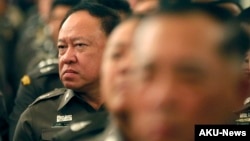Thailand's draft constitution went to political parties for review on Monday, but there's a catch - they are forbidden by the junta from meeting to debate the charter.
The National Reform Council (NRC) completed a week-long debate on the charter on Sunday, before drafters sent the text to the cabinet, the junta and political parties for their feedback.
Thailand has been divided for a decade between supporters of ousted former Prime Minister Thaksin Shinawatra and the Bangkok-based royalist-military establishment, which reviled Thaksin's popularity.
The military seized power on May 22 after months of street protests aimed at ousting Thaksin's sister, then-Prime Minister Yingluck Shinawatra.
The charter, Thailand's 20th since 1932, was written by a 36-member Constitution Drafting Committee appointed by the junta.
Since the coup, the National Council for Peace and Order (NCPO), as the junta calls itself, has kept a tight lid on dissent and political activity, including party meetings.
“If they really want views from political parties then the NCPO should lift or relax rules for parties to hold meetings,” Chamni Sakdiset, deputy leader of the conservative Democrat party, told Reuters.
“The NCPO's order still is - 'no meetings',” he said. “They would only get views from the party leader or party secretary-generals and not from all members of a party.”
Yingluck's Pheu Thai party echoed its rival's call to lift the ban on meetings to discuss the charter.
“It would be a good thing to gather views from everyone in the party,” Chavalit Vichayasut, acting deputy secretary-general of the party, said.
General Lertrat Rattanvanich, a spokesman for the Constitution Drafting Committee, said there was no need for parties to meet as they had been airing their opinions on the constitution in the media.
The drafters say they hope the charter would guard against “parliamentary dictatorship,” but critics say it will weaken political parties and usher in a period of short-lived coalition governments.
The most controversial provisions allow for an unelected prime minister and establish a proportional representation electoral system.
The power of senators, two-thirds of whom would be appointed rather than elected, was another contentious issue, Alongkorn Polbutr, a member of the NRC, told Reuters on Monday.
The charter will be returned to drafters with feedback for possible revision on May 25. The text must be endorsed by Thailand's king by September if a general election promised for early 2016 is to take place.





